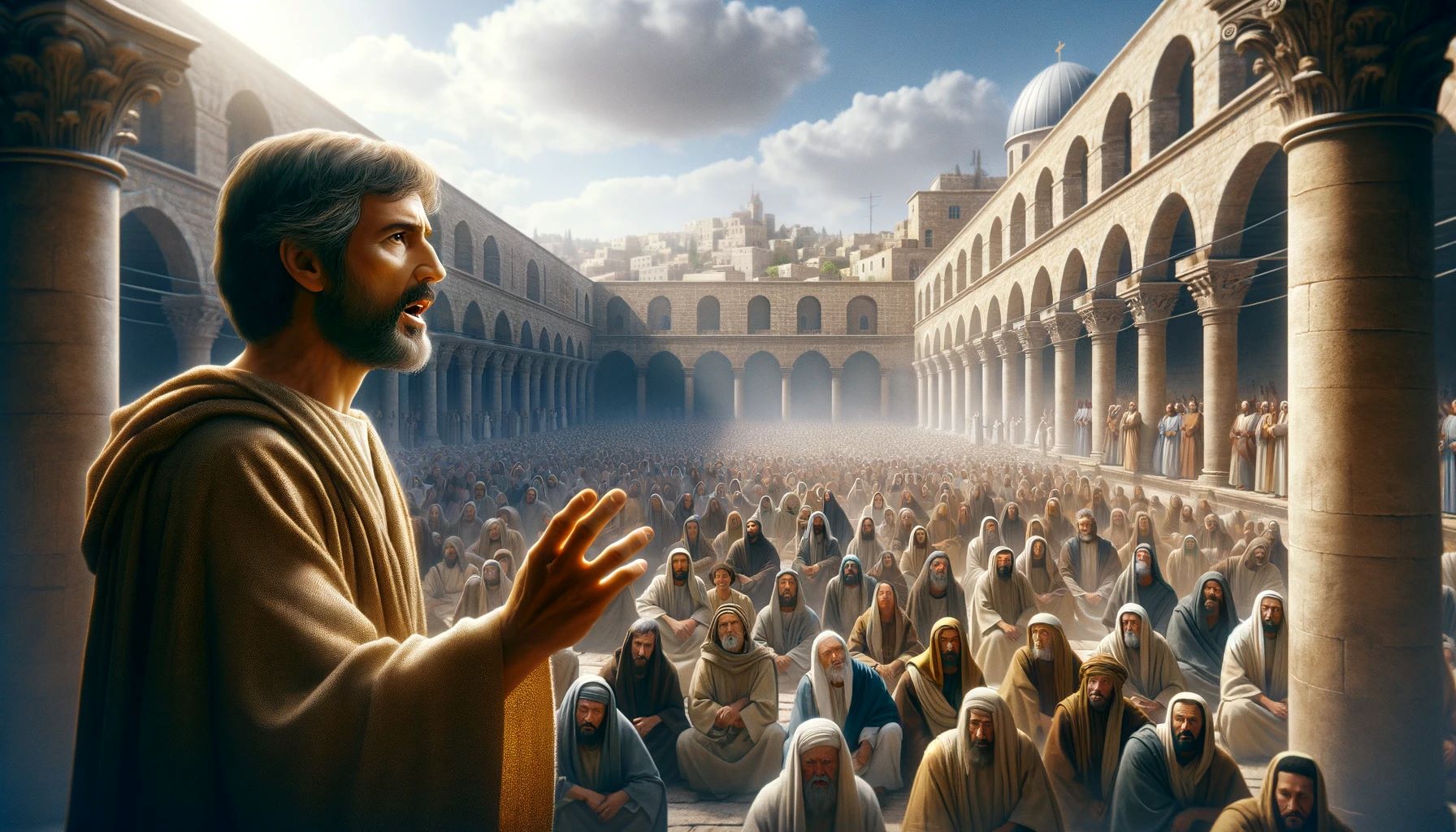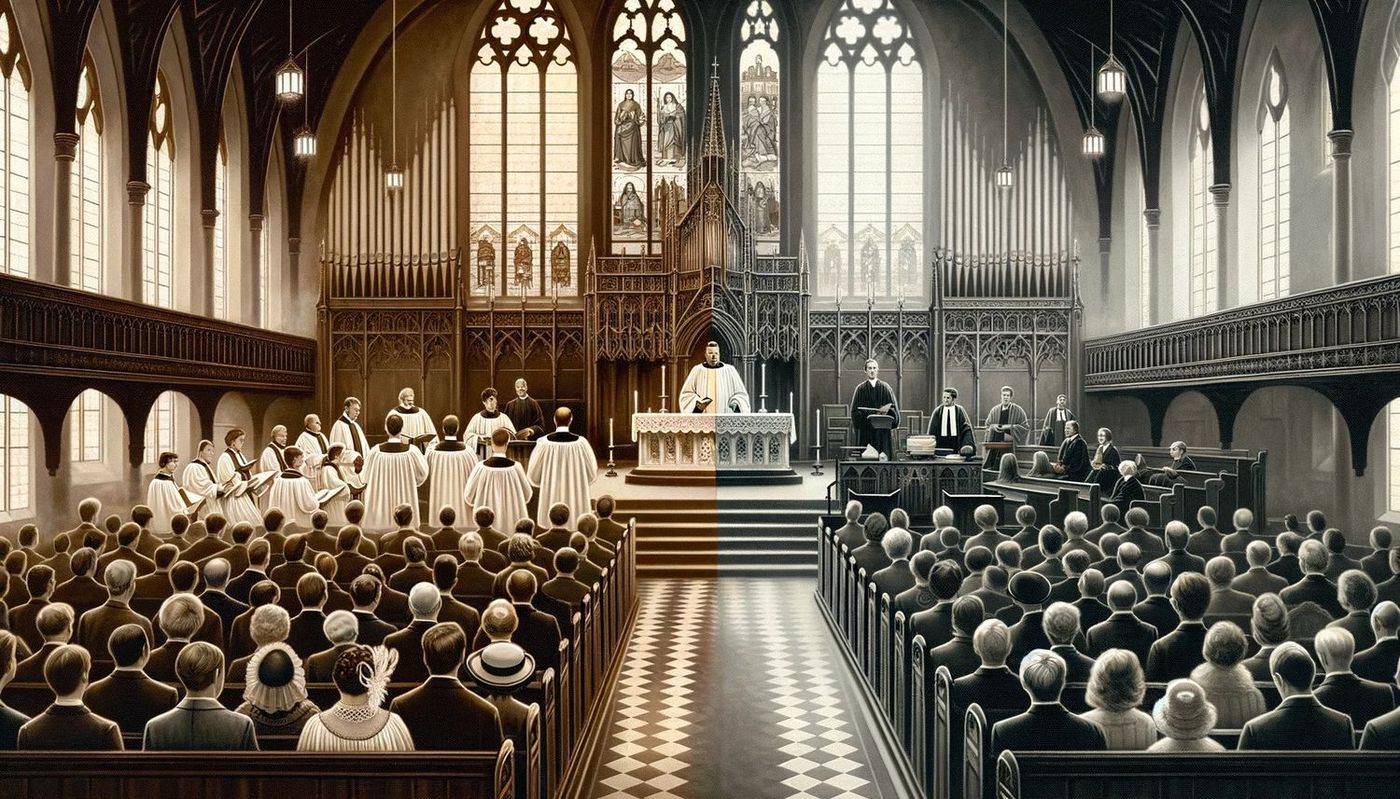Home>Theology and Spirituality>What Is The Difference In Pentecostal And Baptist


Theology and Spirituality
What Is The Difference In Pentecostal And Baptist
Published: February 23, 2024
Ericka Andersen, an editor at Christian.net, expertly merges digital strategy with content creation, focusing on faith and societal issues. Her communication skills enhance the platform's engaging narratives, fostering meaningful dialogue on belief's impact on society.
Discover the key distinctions between Pentecostal and Baptist theology and spirituality. Explore their beliefs, practices, and traditions in this insightful comparison.
(Many of the links in this article redirect to a specific reviewed product. Your purchase of these products through affiliate links helps to generate commission for Christian.net, at no extra cost. Learn more)
Table of Contents
Introduction
The differences between Pentecostal and Baptist denominations are rooted in their distinct theological perspectives, worship styles, and church structures. While both groups are Christian, they hold varying beliefs and practices that shape their religious identities. Understanding these differences can provide valuable insight into the diverse tapestry of Christian faith.
Pentecostalism, which emerged in the early 20th century, emphasizes the direct experience of the Holy Spirit and the practice of spiritual gifts, such as speaking in tongues and divine healing. This movement is characterized by its vibrant worship services and an emphasis on personal spiritual encounters. In contrast, the Baptist tradition traces its roots to the 17th century and is marked by its commitment to believer's baptism and congregational governance.
Exploring the distinctions between these two denominations offers a fascinating glimpse into the rich tapestry of Christian belief and practice. Let's delve deeper into the specific beliefs and practices, worship styles, church structures, views on baptism, and perspectives on the Holy Spirit that set these two traditions apart.
Beliefs and Practices
Pentecostal and Baptist denominations diverge in their beliefs and practices, reflecting their unique theological perspectives and historical development.
Pentecostal Beliefs and Practices
Pentecostalism places a strong emphasis on the direct experience of the Holy Spirit. Adherents believe in the baptism of the Holy Spirit as a distinct event from conversion, often marked by speaking in tongues. This belief is derived from the biblical account of the Day of Pentecost in the Book of Acts, where the Holy Spirit descended upon the apostles, enabling them to speak in different languages. Pentecostals also prioritize the practice of spiritual gifts, such as prophecy, healing, and speaking in tongues, viewing them as evidence of the Holy Spirit's active presence in the believer's life. Worship services in Pentecostal churches are characterized by emotional fervor, spontaneous expressions of praise, and an openness to the leading of the Holy Spirit.
Baptist Beliefs and Practices
Baptists, on the other hand, adhere to the belief in believer's baptism, which is the immersion of adult believers as a public declaration of their faith. This practice symbolizes the individual's identification with the death, burial, and resurrection of Jesus Christ. Unlike infant baptism in some other Christian traditions, Baptists emphasize the importance of a personal decision to follow Christ before undergoing baptism. Additionally, Baptists uphold the authority of Scripture and the autonomy of the local church, meaning that each congregation is self-governing and responsible for its own affairs. Worship in Baptist churches typically follows a more structured format, with an emphasis on biblical preaching and congregational singing.
Contrasting Emphases
The contrasting emphases of Pentecostalism and Baptist traditions reflect their divergent theological priorities. Pentecostals prioritize the experiential aspect of faith, seeking direct encounters with the Holy Spirit and embracing spiritual gifts as integral to their worship and communal life. In contrast, Baptists place a strong emphasis on the believer's personal commitment to Christ, underscored by the act of believer's baptism, and the authority of Scripture in shaping their beliefs and practices.
Understanding these differences illuminates the rich tapestry of Christian belief and practice, showcasing the diverse ways in which faith is expressed and lived out within the broader Christian tradition.
Worship Style
The worship styles of Pentecostal and Baptist churches reflect their distinct theological emphases and cultural expressions of faith.
Pentecostal Worship Style
Pentecostal worship services are characterized by a vibrant and emotionally charged atmosphere. Music plays a central role, often featuring contemporary praise and worship songs that invite congregants to engage in heartfelt expressions of adoration and surrender. The use of musical instruments, including guitars, drums, and keyboards, contributes to the dynamic and energetic nature of Pentecostal worship. Congregants are encouraged to participate actively, often clapping, raising their hands, and even dancing as they express their devotion to God. Spontaneous expressions of praise, such as speaking in tongues and prophetic utterances, are also welcomed, reflecting the belief in the ongoing work of the Holy Spirit in the midst of the gathered community. The worship experience is often characterized by a sense of freedom and expectancy, as congregants anticipate encountering the presence of God in a tangible and transformative way.
Baptist Worship Style
In contrast, Baptist worship services typically follow a more structured format, emphasizing reverence, order, and the centrality of biblical teaching. Hymns and traditional worship songs are commonly featured, accompanied by organ or piano music that evokes a sense of solemnity and reverence. The focus on congregational singing fosters a collective expression of faith, with an emphasis on the rich theological content of the hymns. The sermon holds a prominent place in Baptist worship, with the pastor delivering a message rooted in biblical exposition and practical application. The worship experience is marked by a deliberate and thoughtful approach to engaging with Scripture and responding to its teachings. While Baptist worship may lack the exuberance and spontaneity often found in Pentecostal services, it cultivates a deep sense of reverence and intellectual engagement with the Christian faith.
Diverse Expressions of Worship
These distinct worship styles reflect the diverse ways in which Pentecostal and Baptist congregations seek to honor and encounter God within their respective cultural and theological contexts. While Pentecostal worship emphasizes emotional engagement, spiritual spontaneity, and a sense of divine encounter, Baptist worship prioritizes reverence, biblical instruction, and congregational participation in a more structured manner. Both traditions offer unique expressions of worship that resonate deeply with their adherents, contributing to the rich tapestry of Christian worship practices across the globe.
Church Structure
The organizational structure of Pentecostal and Baptist churches reflects their distinctive approaches to governance, leadership, and decision-making processes. These structural differences are deeply rooted in their theological convictions and historical development.
Pentecostal Church Structure
Pentecostal churches often embrace a more flexible and decentralized approach to church governance. This flexibility is grounded in the belief that the Holy Spirit actively guides and empowers the church community. As a result, Pentecostal congregations may exhibit a greater degree of autonomy, allowing for local leadership to make decisions in alignment with the perceived leading of the Spirit. This emphasis on spiritual discernment and responsiveness to the Holy Spirit's leading can lead to a dynamic and adaptive organizational structure, with a focus on fostering spiritual vitality and responsiveness to the needs of the congregation.
Baptist Church Structure
In contrast, Baptist churches typically adhere to a congregational form of governance, where major decisions are made by the vote of the congregation. This democratic approach underscores the belief in the priesthood of all believers and the autonomy of the local church. While Baptist congregations may affiliate with regional or national associations for support and fellowship, each church maintains its independence in matters of doctrine, polity, and ministry. This commitment to congregational autonomy is often reflected in the election of church leaders and the approval of significant initiatives through a process of congregational consensus.
Distinctive Organizational Dynamics
The contrasting church structures of Pentecostal and Baptist traditions reflect their divergent perspectives on the role of spiritual authority, the discernment of God's leading, and the exercise of decision-making within the faith community. While Pentecostal churches prioritize spiritual responsiveness and adaptability in their organizational dynamics, Baptist churches emphasize congregational participation and the democratic process in shaping the life and direction of the church.
These structural differences contribute to the unique identity and functioning of Pentecostal and Baptist congregations, shaping the way in which they navigate matters of leadership, governance, and communal decision-making within the context of their respective theological convictions.
Views on Baptism
Baptism holds significant theological and symbolic importance in both Pentecostal and Baptist traditions, yet the manner in which it is practiced and understood differs between the two denominations.
Pentecostal Perspective
In Pentecostalism, baptism is viewed as a crucial step in the believer's spiritual journey. While Pentecostals affirm the significance of water baptism as a public declaration of faith and identification with the death and resurrection of Jesus Christ, they also emphasize the distinct experience of baptism in the Holy Spirit. This baptism in the Holy Spirit is often accompanied by the manifestation of spiritual gifts, such as speaking in tongues, and is considered a separate event from water baptism. Pentecostals believe that the baptism in the Holy Spirit empowers believers for Christian service and fosters a deeper connection with the Holy Spirit's ongoing work in their lives. This emphasis on the experiential aspect of baptism aligns with Pentecostalism's broader focus on spiritual encounters and the active presence of the Holy Spirit in the life of the believer.
Baptist Perspective
Baptists hold a distinct perspective on baptism, emphasizing believer's baptism by immersion as the primary mode of administering the sacrament. For Baptists, baptism symbolizes the believer's identification with the death, burial, and resurrection of Jesus Christ and serves as a public testimony of their faith in Christ. Unlike some other Christian traditions that practice infant baptism, Baptists emphasize the importance of a personal decision to follow Christ before undergoing baptism. This emphasis on believer's baptism underscores the Baptist commitment to individual agency and personal faith as foundational to the Christian life. Additionally, Baptists view baptism as an ordinance rather than a sacrament, signifying obedience to Christ's command and the believer's union with Christ in His death and resurrection.
Contrasting Emphases
The differing perspectives on baptism in Pentecostal and Baptist traditions reflect their unique theological emphases and understandings of the Christian faith. While Pentecostals emphasize the experiential dimension of baptism, particularly in the Holy Spirit, Baptists prioritize believer's baptism as a public testimony of personal faith and obedience to Christ's command. These distinct views on baptism contribute to the rich diversity of Christian belief and practice, highlighting the multifaceted ways in which the sacrament is understood and celebrated within the broader Christian tradition.
This detailed exploration of the views on baptism in Pentecostal and Baptist traditions illuminates the theological nuances and symbolic significance attributed to this foundational rite within the Christian faith.
Views on the Holy Spirit
The perspectives on the Holy Spirit within Pentecostal and Baptist traditions offer profound insights into their theological frameworks and spiritual experiences.
Pentecostal View of the Holy Spirit
Pentecostalism places a central focus on the person and work of the Holy Spirit. Adherents of this tradition believe in the ongoing activity of the Holy Spirit in the lives of believers, emphasizing the experience of the baptism in the Holy Spirit as a distinct event subsequent to conversion. This experience, often accompanied by speaking in tongues, is viewed as empowering individuals for Christian service and fostering a deeper connection with the Holy Spirit. Pentecostals also prioritize the practice of spiritual gifts, such as prophecy, healing, and the discerning of spirits, viewing them as tangible manifestations of the Holy Spirit's presence and activity within the faith community. The Holy Spirit is revered as the divine agent who brings about spiritual transformation, empowers believers for ministry, and enables them to live out their faith with boldness and conviction.
Baptist View of the Holy Spirit
In the Baptist tradition, the Holy Spirit is acknowledged as the third person of the Trinity, co-equal with the Father and the Son. Baptists affirm the work of the Holy Spirit in the regeneration and sanctification of believers, emphasizing the Spirit's role in illuminating Scripture, convicting individuals of sin, and empowering them to live godly lives. While Baptists do not emphasize the experiential aspect of the Holy Spirit to the same extent as Pentecostals, they recognize the Spirit's transformative work in the lives of believers and the vital role of the Spirit in guiding and empowering the church for its mission. The Holy Spirit is revered as the divine counselor and comforter who sustains and empowers believers in their Christian walk.
Contrasting Emphases
The contrasting emphases on the Holy Spirit in Pentecostal and Baptist traditions reflect their unique theological priorities and spiritual orientations. Pentecostals prioritize the experiential dimension of the Holy Spirit, seeking tangible encounters and manifestations of the Spirit's presence, while Baptists emphasize the transformative and empowering work of the Spirit within the framework of biblical teaching and spiritual formation. These distinctive perspectives contribute to the rich diversity of Christian belief and practice, highlighting the multifaceted ways in which the Holy Spirit is understood and revered within the broader Christian tradition.
This exploration of the views on the Holy Spirit in Pentecostal and Baptist traditions underscores the profound significance of the Spirit's presence and activity within the Christian faith, shaping the spiritual experiences and theological convictions of these distinct denominational expressions.
Conclusion
In conclusion, the differences between Pentecostal and Baptist traditions encompass a wide array of theological perspectives, worship styles, church structures, and views on sacraments and the Holy Spirit. These distinctions reflect the diverse ways in which Christian faith is expressed and lived out within the broader Christian tradition.
Pentecostalism, with its emphasis on the direct experience of the Holy Spirit and the practice of spiritual gifts, embodies a vibrant and emotionally charged worship style that fosters a sense of divine encounter and spiritual empowerment. The flexible and decentralized church structure of Pentecostal congregations reflects a commitment to spiritual responsiveness and adaptability, allowing for a dynamic expression of faith within the local community.
On the other hand, the Baptist tradition, anchored in the belief in believer's baptism and congregational governance, embodies a more structured and reverent worship style that prioritizes biblical teaching and congregational participation. The congregational form of governance underscores the Baptist commitment to the priesthood of all believers and the autonomy of the local church, shaping a democratic and participatory approach to decision-making within the faith community.
The contrasting perspectives on baptism and the Holy Spirit further illuminate the theological nuances and spiritual orientations of these two traditions. While Pentecostals emphasize the experiential dimension of faith, seeking tangible encounters with the Holy Spirit and embracing spiritual gifts as evidence of the Spirit's active presence, Baptists prioritize believer's baptism as a public testimony of personal faith and obedience to Christ's command, and recognize the transformative work of the Holy Spirit within the framework of biblical teaching and spiritual formation.
Ultimately, the differences between Pentecostal and Baptist traditions serve as a testament to the rich tapestry of Christian belief and practice. Both traditions offer unique expressions of worship, theological perspectives, and communal dynamics that resonate deeply with their adherents, contributing to the diverse and multifaceted landscape of the Christian faith.
Understanding and appreciating these differences not only enriches our knowledge of Christian denominational diversity but also fosters a spirit of unity and mutual respect within the broader body of Christ. As we celebrate the distinct contributions of Pentecostalism and Baptist traditions, we recognize the common foundation of faith in Christ that unites all believers, transcending denominational boundaries and fostering a shared commitment to the gospel and the mission of the church.












